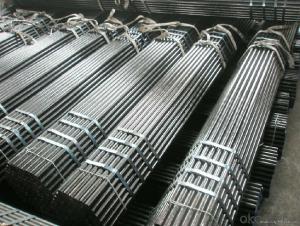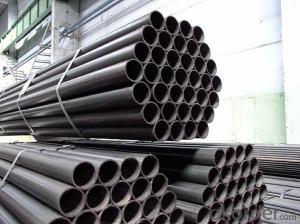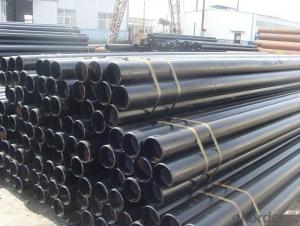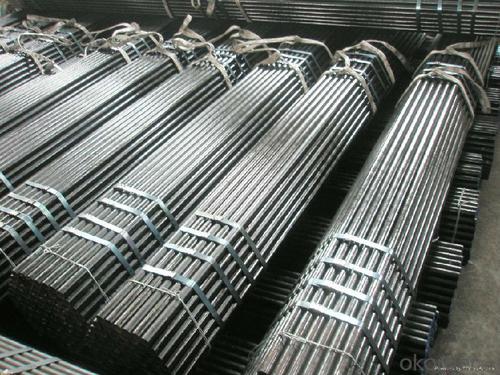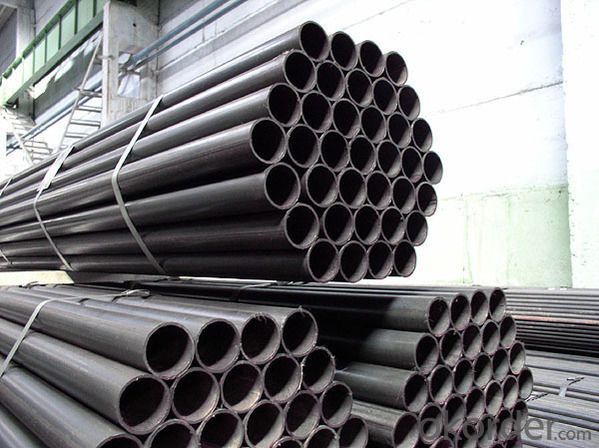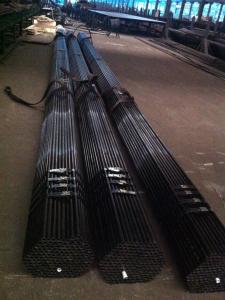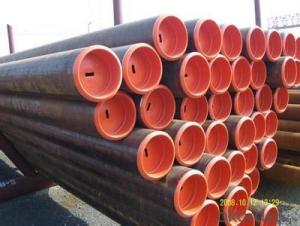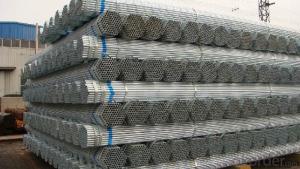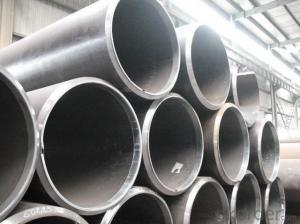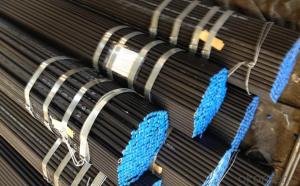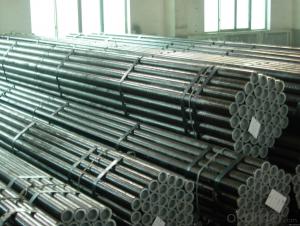Seamless Steel Pipes from Okorder ASTMA53/106
- Loading Port:
- Tianjin
- Payment Terms:
- TT OR LC
- Min Order Qty:
- 100 m.t.
- Supply Capability:
- 3000 m.t./month
OKorder Service Pledge
OKorder Financial Service
You Might Also Like
Product Description:
1、Structure of Seamless Steel Pipes ASTMA53/106 GR.B Description:
A large amount of Seamless Steel Pipes are offered to the clients at cost effective rates. These pipes are extremely durable, resistant to corrosion and have high tensile strength. Our pipes are used in nuclear plants, power plants, refineries and construction industry across the country. Furthermore, we are capable of providing these seamless pipes to the clients in bulk quantity.
2、Main Features of the Seamless Steel Pipe:
• High manufacturing accuracy
• High strength
• Small inertia resistance
• Strong heat dissipation ability
• Good visual effect
• Reasonable price
3、Seamless Steel Pipes Images:
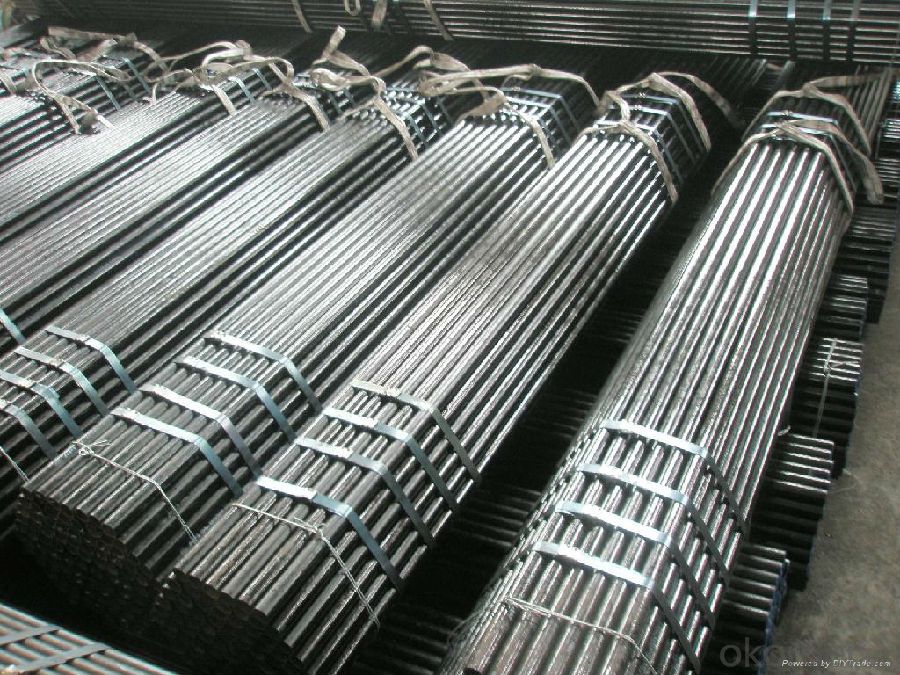
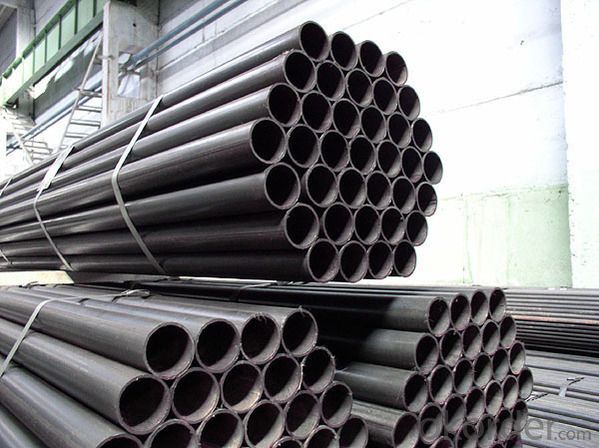
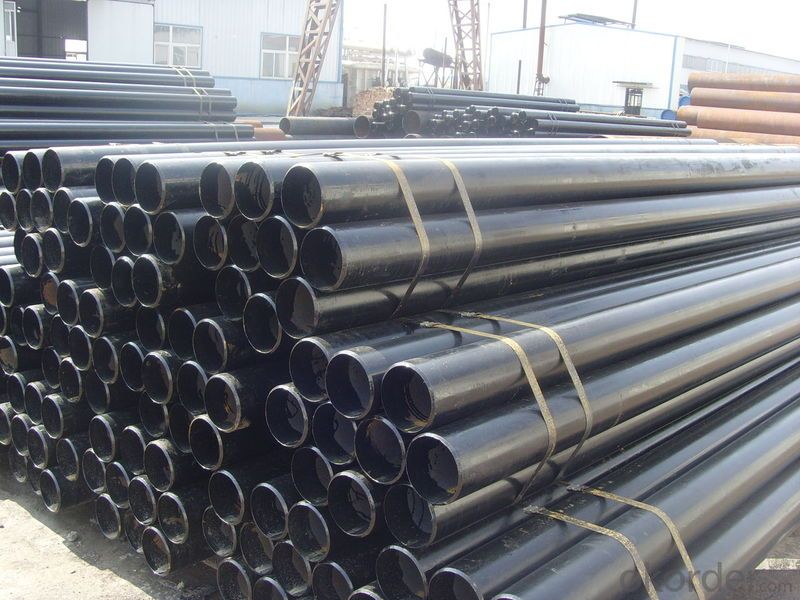
Packaging & Delivery
| Packaging Details: | beveled, plastic caps covered two ends, black painting, marking on each pipe, tied in bundles by steel strip for the convenience of long distance transportation. |
Delivery Detail: | Pipes in stock , immediately; If produce, around 15 days |
4、 Seamless steel pipe Specification:
Standard:
GB, DIN, ASTM, API
GB/T8162, GB/T8163, GB/T 3087, GB/T5310, DIN 1626, DIN 17175, ASTM A106-2006, ASTM A53-2007, ASTM A210-1996, ASTM A333-2005, ASTM A179-1990, ANSI B36.10M-2004, ASME B36.10M-2004, API 5CT, API 5LGrade:
10#-45#, Cr-Mo alloy, A53-A369, API J55-API P110, ST35-ST52, Q195-Q345
10#, 20#, 45#, 30CrMo, A53(A,B), A106(B,C), A210, A178-C, API J55, API K55, API N80, St37, St42, St52.4, Q345Thickness:
0.8 - 60 mm
Section Shape:
Round
Outer Diameter:
5- 920 mm
Secondary Or Not:
Non-secondary
Application:
Oil Pipe
Technique:
Hot Rolled
Certification:
ISO, API
Surface Treatment:
COATING: OILED
Special Pipe:
API Pipe
Alloy Or Not:
Non-alloy
Carbon Steel Seamless Pipes API 5L GR.B/ ASTMA53/A106 GR.B
Size: | od245mm*wt10mm |
Brand Name: | XPY |
Outside diameter: | 5-920mm |
Wall thickness: | 0.8-60mm |
Length: | random or fixed |
Price Terms: | FOB, CNF, CIF |
Shipment: | in containers or in bulk |
Standard: | ASTMA53, A106 GR.B; ASTM178-C; ASTMA1045; ASTMA283-D; A210-C; API5L ; API5CT, St33, St52, St42, St45-8, DIN1629, DIN17175; BS, JIS and so on. |
CHINESE STANDARD | AMERICAN STANDARD | GERMAN STANDARD |
20# | ASTMA106-B | St45-8 DIN17175 |
ASTMA53-B | St42-2 DIN1626 | |
ASTM178-C | St45-4 DIN1629 | |
45# | ASTMA1045 | CK45 |
16Mn | A210-C | St52.4 DIN1629 |
St52 DIN1629 | ||
37Mn5 | J55 | |
Q235 | ASTMA283-D | St33 |
5、 FAQ of Seemless Steel Pipes:
①How is the quality of your products?
Our products are manufactured strictly according to national and internaional standard, and we take a test
on every pipe before delivered out. If you want see our quality certifications and all kinds of testing report, please just ask us for it.
Guaranteed: If products’ quality don’t accord to discription as we give or the promise before you place order, we promise 100% refund.
②How about price?
Yes, we are factory and be able to give you lowest price below market one, and we have a policy that “ for saving time and absolutely honest business attitude, we quote as lowest as possible for any customer, and discount can be given according to quantity”,if you like bargain and factory price is not low enough as you think, just don’t waste your time.Please trust the quotation we would give you, it is professional one.
③Why should you chose us?
Chose happens because of quality, then price, We can give you both.Additionally, we can also offer professional products inquiry, products knowledge train(for agents), smooth goods delivery, exellent customer solution proposals.Our service formula: good quality+good price+good service=customer’s trust
SGS test is available, customer inspection before shipping is welcome, third party inspection is no problem.
Any question, pls feel free to contact us !
- Q: What are the different sizes of steel pipe nipples?
- Steel pipe nipples come in a variety of sizes, ranging from 1/8 inch to 6 inches in diameter.
- Q: How are steel pipes used in the manufacturing of power plants?
- Steel pipes are commonly used in the manufacturing of power plants for various purposes such as transporting fluids, gases, and steam. They are utilized for the construction of pipelines that carry water, fuel, and coolant to different parts of the power plant. Additionally, steel pipes are employed in the creation of boiler tubes and heat exchangers, which play a crucial role in the generation of steam and transfer of heat in power plants.
- Q: Can steel pipes be used for conveying food and beverages?
- Steel pipes can be used for conveying food and beverages, but certain precautions need to be taken to ensure their safety and suitability for this purpose. Firstly, it is important to choose food-grade stainless steel pipes that are specifically designed for handling food and beverage products. These pipes are made from high-quality stainless steel that is resistant to corrosion and does not leach harmful substances into the food or beverage. Secondly, the pipes should be properly cleaned and sanitized before and after each use to maintain hygiene standards. Regular cleaning and maintenance will prevent the accumulation of bacteria or contaminants that could potentially contaminate the food or beverage being transported. Additionally, it is crucial to consider the compatibility of the food or beverage with the steel pipes. Certain acidic or corrosive substances may react with the steel, causing contamination or compromising the integrity of the pipes. In such cases, alternative materials like food-grade plastic or rubber may be more suitable. Overall, steel pipes can be used for conveying food and beverages, but it is essential to ensure the use of food-grade stainless steel pipes, proper cleaning and sanitization, and compatibility with the specific food or beverage being transported. Following these guidelines will help maintain the safety and quality of the food or beverage during transportation.
- Q: How do you connect steel pipes together?
- Steel pipes can be connected together using various methods such as welding, threading, flanges, or mechanical couplings. Welding involves fusing the ends of the pipes together using heat, while threading involves cutting grooves into the pipe ends and screwing them together. Flanges are used to connect pipes using bolts and gaskets, providing a secure and leak-proof joint. Mechanical couplings utilize compression fittings or clamps to connect pipes without the need for welding or threading. The appropriate method depends on the specific application, pipe size, and project requirements.
- Q: What is the difference between steel pipes and PEX pipes?
- Steel pipes are made from steel, a durable and strong material, while PEX pipes are made from cross-linked polyethylene, a flexible and lightweight material. Steel pipes are typically used for high-pressure applications, such as plumbing systems in commercial buildings, while PEX pipes are commonly used in residential plumbing due to their ease of installation, resistance to freezing and bursting, and lower cost. Additionally, steel pipes require threading and soldering for connections, while PEX pipes use push-fit or crimp fittings, making them easier to work with.
- Q: How are steel pipes used in the automotive exhaust systems?
- Steel pipes are commonly used in automotive exhaust systems because steel is a durable and heat-resistant material. Steel pipes are used to transport the exhaust gases from the engine to the muffler and tailpipe, ensuring that the gases are safely and efficiently expelled from the vehicle. These pipes are designed to withstand high temperatures, corrosion, and vibration, making them an essential component in the exhaust system.
- Q: What are the different types of coatings applied to steel pipes?
- There are several types of coatings that can be applied to steel pipes, including epoxy, polyethylene, fusion bonded epoxy (FBE), and zinc coatings. These coatings provide protection against corrosion, abrasion, and chemical damage, ensuring the longevity and durability of the steel pipes in various applications.
- Q: What are the future trends in steel pipe manufacturing?
- Some future trends in steel pipe manufacturing include the adoption of advanced technologies such as automation and robotics, the development of high-performance and sustainable materials, the implementation of efficient and eco-friendly production processes, and the integration of digitalization and data analytics for improved quality control and supply chain management. Additionally, there is a growing focus on the development of specialized pipes for specific industries such as oil and gas, construction, and automotive, as well as an increased emphasis on product customization and tailored solutions to meet the evolving needs of customers.
- Q: How are steel pipes used in the manufacturing of food and beverage processing plants?
- Steel pipes are commonly used in the manufacturing of food and beverage processing plants due to their durability, cleanliness, and resistance to corrosion. These pipes are utilized for various purposes such as transporting liquids, gases, and ingredients within the plant. They are also essential for the distribution of water, steam, and other fluids required in the production and cleaning processes. Additionally, steel pipes are used for the installation of equipment, such as pumps and valves, ensuring a safe and efficient operation of the plant.
- Q: How are steel pipes used in the petrochemical industry?
- Steel pipes are commonly used in the petrochemical industry for various purposes such as transporting and distributing fluids and gases, as well as providing structural support for equipment. They are particularly preferred due to their high strength, durability, and resistance to corrosion, making them suitable for handling harsh and corrosive substances.
Send your message to us
Seamless Steel Pipes from Okorder ASTMA53/106
- Loading Port:
- Tianjin
- Payment Terms:
- TT OR LC
- Min Order Qty:
- 100 m.t.
- Supply Capability:
- 3000 m.t./month
OKorder Service Pledge
OKorder Financial Service
Similar products
Hot products
Hot Searches
Related keywords
